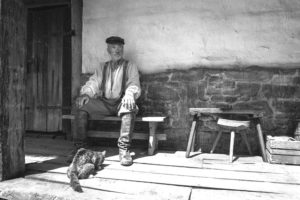
Udo Kier, the incredible German-born actor, who has lived in Palm Springs, CA since 1991—finds joy in tending his garden, and collecting art, yet, he has made a living playing dark monsters and lowlife brutes. You may not know his name, but you are sure to recognize his face and his piercing green eyes, yes green, he confirmed with me that his light eyes typically take on the color that he is wearing, his actual color is green. He’s had an astonishing career, including working with both Joaquin and River Phoenix. He considers the Phoenix family dear friends, as I asked him about working with River and Keanu Reeves in “My Own Private Idaho” (1991). He’s had a prolific acting career playing notable characters like Count Dracula, Dr. Jekyll, Frankenstein, Jack the Ripper, and Adolf Hitler.
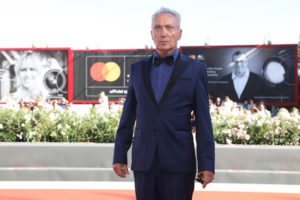
His new film, “The Painted Bird” is a tough film to watch, and it is certainly not for the faint of heart. In viewing a screening link, I could stop and start to take a breather from the violence and inhumanity displayed during the end of WW II in Eastern Europe. Kier is terrifying in the film, his household dreads his every move, his performance just may be Oscar worthy, although his actions are hard to view. The nearly three-hour viewing time is a commitment, filmed in black and white, the cinematography is stunning. Udo Keir has one word for the film, ‘masterpiece.’ Based on Jerzy Kosinski’s novel of the same name, its director is Václav Marhoul, with an impressive cast, including Harvey Keitel and Stellan Skarsgård. “The Painted Bird” centers on a young Jewish boy played by Petr Kotlár, who is seeking refuge, yearning to find any kindhearted soul to help him reunite with his parents.
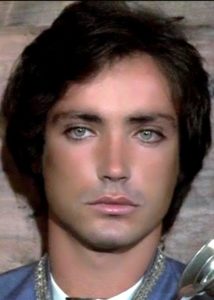
Our interview took place on July 16, 2020, via video Zoom, I appreciated his elaboration on all of his answers, here’s an edited version of the highlights.
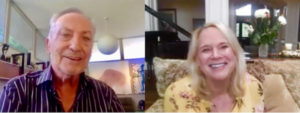
Sarah Knight Adamson:
I finished the film last night, and I could relate because my uncle Bill was an American soldier in World War II and, he was in France at the end of the war. He told me that time was sorrowful and dangerous in the war because when German soldiers would come in sight, they would not take prisoners, they had orders to kill. So, I could somewhat identify with the feeling of desperation through my uncle’s first-hand account. Could you talk about the atmosphere of that movie?
Udo Kier:
When I got the offer to do this movie, I could relate very much to the time because I was born at the end of 1944 during the war. My mother went to the hospital and said to the nurses, “Can I have him a little longer?” Then an enemy plane destroyed the hospital. She made a hole in the wall to hide us, and that was the first few hours of my life. When I got the script, I remembered that I read Jerzy Kosiński’s book, “The Painted Bird”, but of course, I read it right away again because I like the book.
The strong thing about that movie is Vladimir Smutny, the cameraman, because I don’t think it would have worked in color. After all, you can truly see, black and white, I grew up with black and white films, like “Casablanca” and Hitchcock films, and film is shadow and light. If you make a film, like this story, almost like a documentary, it’s perfect. I think in my private opinion it wouldn’t have worked in color, but I saw the film in Los Angeles because as an actor, I never see dailies or rushes I only like to see the movie when it’s done.
I saw it in Los Angeles and had a few moments after the movie where I couldn’t talk because it is so strong, but you see, it’s not pretentious. There’s a difference with people from that period, I know a lot of people in America, I’ve lived here 30 years. I know people whose parents were killed in a concentration camp. In Germany, when I grew up, they didn’t tell us at school about it. It was such a black time that they didn’t tell the children about this. I found out over the years, and that’s why at age 19 I left Germany, I went to England, and I also lived in Rome and Paris. It’s not showing the exit of the concentration camp. The boy simply runs away.
Sarah Knight Adamson:
Yes. I’m still processing the film myself. Your career is so fascinating to read about. You are certainly a wonderful actor. I would like to confirm, and it’s hard for me to tell right now, but are your eyes blue, or are they green?
Udo Kier:
Well, it depends when you have ‘light eyes’ as I do, so it depends on what you wear. If I wear a bright green shirt, they become green. If it’s blue it’s because there are lights near me or they’re reflect the background. I don’t even know what it says in my passport. I would say green for sure.
Sarah Knight Adamson: I’ve never met anybody that has worked with River Phoenix. Could you talk about him for a little bit, please?
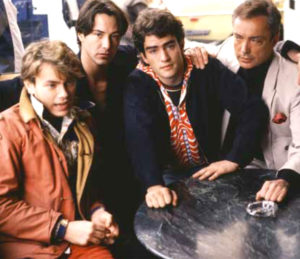
Udo Kier:
Now, I’ll tell you a story. When I started making movies, I wanted to be an actor. I was living in London, and I wanted to learn English. I started making movies and worked with wonderful directors like Fassbinder and Lars von Trier. I have never in my life asked a director, “I would like to work with you.” Imagine if you said to David Lynch, “I would like to work with you,” He would answer, “Who doesn’t?”
I was in Berlin, and a young director came to me at the festival and said, “My name is Gus Van Sant. I have a little movie at the festival I made for $20,000, “Mala Noche,” but I’m making a movie with Keanu Reeves and River Phoenix.” I lived in Germany, so I had never heard of them; [Keanu Reeves and River Phoenix], Gus said, “I want you to play Hans because if you’re German, your name is Hans.”
I came to Idaho, and we had dinner, and Gus introduced me to River and Keanu. River called me Hans right away. I wasn’t Udo; I was Hans. And then we went out, unfortunately, because I played kind of a sugar daddy, when we went out, I had to pay all the time and because he would say “Hans, pay!” I think he was an amazing actor. At that time, he also moved out of the hotel and was living and making music in the garage of Gus Van Sant, and he liked that. He said, “I cannot play a street house while living in a five-star hotel,” which I agree with.
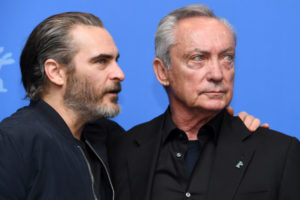
I know his mother and his father of course, and Joaquin, because when River made the film, “My Private Idaho,” Joaquin came to visit the set, I think he was 15. Also, I was in the film, “Don’t Worry, He Won’t Get Far on Foot,” with Joaquin. [Udo Kier is again cast as Hans.] They’re amazing actors because both of them also have a different reason why they want to be an actor. For example, Joaquin, Gus told me, went around in the wheelchair for days just to have that feeling. So, it’s not only Daniel Day Lewis who gets very close to his kind of role, it’s also Joaquin and River. It’s a great, great family, Rain, Phoenix, Summer, and they all have these wonderful names. Joaquin’s real name is Leaf; their parents gave them names of nature. I was really, very, very sad and was in Germany when the news came on TV that River had died, because he died so young, my god. They are all such lovely people.
Sarah Knight Adamson:
Yes. Thank you so much for your story. Is there anything else you’d like to say about “The Painted Bird?”
Udo Kier:
“The Painted Bird,” yes, I don’t use this word after I’ve been in so many movies and 50 years experience, but, yes “masterpiece.” This film for me a masterpiece. It’s not pretentious. The vision is amazing. The actors are so good, and by using actors nobody knows, then you’ll really follow their acting, their character. Of course, the wonderful, Harvey Keitel, and wonderful Stellan Skarsgård, with whom I worked a lot with Lars Von Trier, but I think the film is not only the Kosiński novel, it was Vaclav, the director’s baby for years and years, he prepared that film. So everything was just ready when I came there. I was very happy, I stayed in my set. I slept on my set. I didn’t want to talk to anybody to get into this atmosphere.
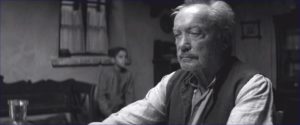
I do like making movies, and I like telling stories. My next movie coming out is called “My Neighbor, Adolf,” it’s an Israeli production with David Hayman and myself, we are the two leads. [ Udo plays a person his neighbor suspects is Adolf Hitler.]
Sarah Knight Adamson:
Oh, that sounds wonderful, I’ll have to look for that. Best of luck with the film, and thank you so much for speaking with me today. I really enjoyed our conversation.
Udo Kier:
Okay. Me too.
Sarah Knight Adamson© July 16, 2020
